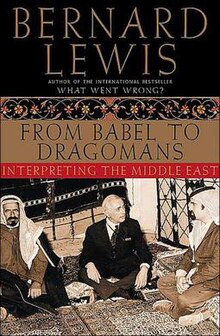From Babel to Dragomans
Appearance
 | |
| Author | Bernard Lewis |
|---|---|
| Language | English |
| Subject | Middle East and the Islamic world |
| Genre | Islamic history |
| Publisher | Oxford University Press |
Publication date | May 2, 2004 |
| Publication place | United States |
| Media type | Print (Hardcover, Paperback), E-book |
| Pages | 456 |
| ISBN | 978-0195173369 |
| OCLC | 1171225675 |
From Babel to Dragomans: Interpreting the Middle East is a 2004 book written by Middle-East historian Bernard Lewis. The book comprises a series of scholarly essays and speeches given by Lewis over a period of four decades on the topic of the Middle East and the Islamic world.[1][2][3][4]
Contents
[edit]- Chapter 1 : An Islamic mosque
- Chapter 2 : From Babel to Dragomans
- Chapter 3 : Middle East feasts
- Chapter 4 : Iran in history
- Chapter 5 : Palimpsests of Jewish history : Christian, Muslim and secular diaspora
- Chapter 6 : Some notes on land, money and power in medieval Islam
- Chapter 7 : An interpretation of Fatimid history
- Chapter 8 : Propaganda in the pre-modern Middle East : a preliminary classification
- Chapter 9 : Monarchy in the Middle East
- Chapter 10 : Religion and murder in the Middle East
- Chapter 11 : The Mughals and the Ottomans
- Chapter 12 : Europe and the Turks : the civilization of the Ottoman empire
- Chapter 13 : Europe and Islam : Muslim perceptions and experience
- Chapter 14 : Cold war and detente in the sixteenth century
- Chapter 15 : From pilgrims to tourists : a survey of Middle Eastern travel
- Chapter 16 : The British mandate for Palestine in historical perspective
- Chapter 17 : Pan-Arabism
- Chapter 18 : The emergence of modern Israel
- Chapter 19 : Orientalist notes on the Soviet-United Arab Republic Treaty of 27 May 1971
- Chapter 20 : A taxonomy of group hatred
- Chapter 21 : Islam and the West
- Chapter 22 : The Middle East, westernized despite itself
- Chapter 23 : The Middle East in world affairs
- Chapter 24 : Friends and enemies : reflections after a war
- Chapter 25 : Return to Cairo
- Chapter 26 : Middle East at prayer
- Chapter 27 : At the United Nations
- Chapter 28 : The anti-Zionist resolution
- Chapter 29 : Right and left in Lebanon
- Chapter 30 : The Shi'a
- Chapter 31 : Islamic revolution
- Chapter 32 : The enemies of God
- Chapter 33 : The roots of Muslim rage
- Chapter 34 : The other Middle East problems
- Chapter 35 : Did you say "American imperialism"? : power, weakness, and choices in the Middle East
- Chapter 36 : The law of Islam
- Chapter 37 : Not everybody hates Saddam
- Chapter 38 : Mideast states : pawns no longer in imperial games
- Chapter 39 : What Saddam wrought
- Chapter 40 : The "sick man" of today coughs closer to home
- Chapter 41 : Revisiting the paradox of modern Turkey
- Chapter 42 : We must be clear
- Chapter 43 : Deconstructing Osama and his evil appeal
- Chapter 44 : Targeted by a history of hatred
- Chapter 45 : A time for toppling
- Chapter 46 : In defense of history
- Chapter 47 : First-person narrative in the Middle East
- Chapter 48 : Reflections on Islamic historiography
- Chapter 49 : The Ottoman archives : a source for European history
- Chapter 50 : History writing and national revival in Turkey
- Chapter 51 : On occidentalism and orientalism
References
[edit]- ^ Pryce-Jones, David (16 May 2004). "Review: Politics: From Babel to Dragomans by Bernard Lewis". The Times. Retrieved 31 July 2020.
- ^ Miles, Oliver (17 July 2004). "Lewis gun". The Guardian. Retrieved 31 July 2020.
- ^ Irwin, Robert (2 July 2004). "From Babel to Dragomans by Bernard Lewis — Lost in Arabic translation". The Independent. Retrieved 31 July 2020.
- ^ L. Carl, Brown (November 2004). "Capsule Review: From Babel to Dragomans: Interpreting the Middle East". Foreign Affairs. Retrieved 31 July 2020.
